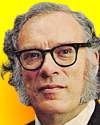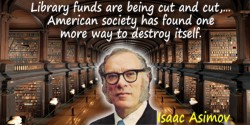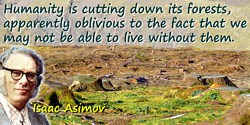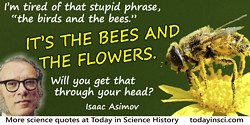 (source)
(source)
|
Isaac Asimov
(2 Jan 1920 - 6 Apr 1992)
Russian-American writer and biochemist who was a prolific author and editor of science fiction and non-fiction.
|
Isaac Asimov Quotes on Understanding (10 quotes)
>> Click for 266 Science Quotes by Isaac Asimov
>> Click for Isaac Asimov Quotes on | Belief | Biography | Creationist | Death | Fear | Ignorance | Knowledge | Life | Science | Scientist | Solution | Theory | Universe |
>> Click for 266 Science Quotes by Isaac Asimov
>> Click for Isaac Asimov Quotes on | Belief | Biography | Creationist | Death | Fear | Ignorance | Knowledge | Life | Science | Scientist | Solution | Theory | Universe |
[Learning is] the actual process of broadening yourself, of knowing there’s a little extra facet of the universe you know about and can think about and can understand. It seems to me that when it’s time to die, and that will come to all of us, there’ll be a certain pleasure in thinking that you had utilized your life well, that you had learned as much as you could, gathered in as much as possible of the universe, and enjoyed it. I mean, there’s only this universe and only this one lifetime to try to grasp it. And, while it is inconceivable that anyone can grasp more than a tiny portion of it, at least do that much. What a tragedy to just pass through and get nothing out of it.
— Isaac Asimov
'Isaac Asimov Speaks' with Bill Moyers in The Humanist (Jan/Feb 1989), 49. Reprinted in Carl Howard Freedman (ed.), Conversations with Isaac Asimov (2005), 139.
Early in my school career, I turned out to be an incorrigible disciplinary problem. I could understand what the teacher was saying as fast as she could say it, I found time hanging heavy, so I would occasionally talk to my neighbor. That was my great crime, I talked in school.
— Isaac Asimov
In In Memory Yet Green: the Autobiography of Isaac Asimov, 1920-1954 (1979), 73.
I am not a speed reader. I am a speed understander.
— Isaac Asimov
In Cris Tovani, Do I Really Have to Teach Reading? (2004), 51
I believe that only scientists can understand the universe. It is not so much that I have confidence in scientists being right, but that I have so much in nonscientists being wrong.
— Isaac Asimov
Webmaster has not yet been able to confirm this attribution. If you know an original print citation, please contact Webmaster.
Increasingly, our leaders must deal with dangers that threaten the entire world, where an understanding of those dangers and the possible solutions depend on a good grasp of science. The ozone layer, the greenhouse effect, acid rain, questions of diet and of heredity--all require scientific literacy. Can Americans choose the proper leaders and support the proper programs if they are scientifically illiterate?
— Isaac Asimov
articles.latimes.com/1989-03-31/news/vw-543_1_scientific-literacy
Increasingly, our leaders must deal with dangers that threaten the entire world, where an understanding of those dangers and the possible solutions depends on a good grasp of science. The ozone layer, the greenhouse effect, acid rain, questions of diet and heredity. All require scientific literacy. Can Americans choose the proper leaders and support the proper programs if they themselves are scientifically illiterate? The whole premise of democracy is that it is safe to leave important questions to the court of public opinion—but is it safe to leave them to the court of public ignorance?
— Isaac Asimov
In Los Angeles Times (31 Mar 1989).
Intelligence is an extremely subtle concept. It’s a kind of understanding that flourishes if it’s combined with a good memory, but exists anyway even in the absence of good memory. It’s the ability to draw consequences from causes, to make correct inferences, to foresee what might be the result, to work out logical problems, to be reasonable, rational, to have the ability to understand the solution from perhaps insufficient information. You know when a person is intelligent, but you can be easily fooled if you are not yourself intelligent.
— Isaac Asimov
In Irv Broughton (ed.), The Writer's Mind: Interviews with American Authors (1990), Vol. 2, 57.
It was not until 1901 that humanity knew that nuclear energy existed. It is understandable now—but useless—to wish that we still lived in the ignorance of 1900.
— Isaac Asimov
Epigraph in Isaac Asimov’s Book of Science and Nature Quotations (1988), 176.
Science must be taught well, if a student is to understand the coming decades he must live through.
— Isaac Asimov
Epigraph in Isaac Asimov’s Book of Science and Nature Quotations (1988), 255.
The rainbow, “the bridge of the gods,” proved to be the bridge to our understanding of light—much more important.
— Isaac Asimov
Epigraph in Isaac Asimov’s Book of Science and Nature Quotations (1988), 189.
See also:
- 2 Jan - short biography, births, deaths and events on date of Asimov's birth.
- Isaac Asimov - context of quote “It’s the bees and the flowers.” - Medium image (500 x 250 px)
- Isaac Asimov - context of quote “It’s the bees and the flowers.” - Large image (800 x 400 px)
- Asimov's Chronology of Science and Discovery, by Isaac Asimov. - book suggestion.
- Booklist for Isaac Asimov.



 In science it often happens that scientists say, 'You know that's a really good argument; my position is mistaken,' and then they would actually change their minds and you never hear that old view from them again. They really do it. It doesn't happen as often as it should, because scientists are human and change is sometimes painful. But it happens every day. I cannot recall the last time something like that happened in politics or religion.
(1987) --
In science it often happens that scientists say, 'You know that's a really good argument; my position is mistaken,' and then they would actually change their minds and you never hear that old view from them again. They really do it. It doesn't happen as often as it should, because scientists are human and change is sometimes painful. But it happens every day. I cannot recall the last time something like that happened in politics or religion.
(1987) -- 


